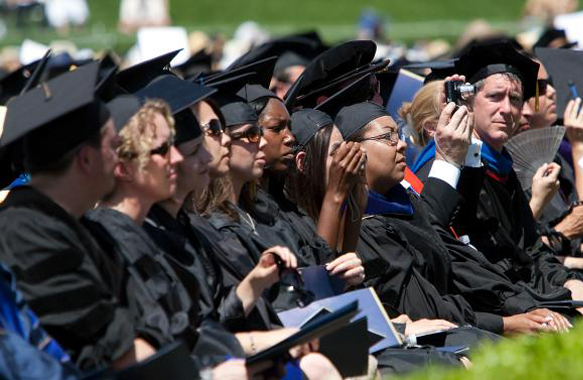Photograph; Members of the University of California, Merced, Class of 2009 listen as first lady Michelle Obama delivers the commencement speech on May 16, 2009. | David Paul Morris/Getty Images
By Erin C.J. Robertson | Originally Published at The Root. June 26, 2014 12:01 PM
Six years after the Great Recession, young black Americans still have a disproportionately high unemployment rate—16.6 percent—and need to attain two additional levels of education to have the same likelihood of obtaining a job as their white counterparts.
“Young African Americans need two more levels of education than their young white counterparts to have the same chance at employment” is the stark conclusion of a new study from Young Invincibles, a nonpartisan, nonprofit organization that focuses on young Americans.
The study, “Closing the Race Gap” (pdf), confirms the timeless adage that as a black person, “you have to be twice as good” to accomplish the same as white peers.
To test how education closes the employment gap between black and whites, researchers analyzed data from the U.S. Census Bureau’s 2013 Current Population Survey, isolating the effects of race and educational level, from having no high school diploma to graduating from high school, earning some college credits and getting an associate, bachelor’s or professional degree.
The study indicates that a black man needs to possess an associate degree to have the same likelihood of finding a job as a white male high school graduate. The educational gap is closer but still apparent for black women: Black women with a bachelor’s degree are still less likely than white women with an associate degree to be employed.
Race is associated with unequal unemployment rates at every level of educational achievement; however, the findings also point out that there is greater added value for each additional educational level a black young adult achieves in terms of increasing employment opportunities and income. In other words, the racial employment gap gets smaller the higher the educational level.
The study’s results come at a time when six-and-a-half years after the start of the Great Recession, and as of May 2014, African-American millennials (18 to 34 years old) have a 16.6 percent unemployment rate. That figure is more than double the unemployment rate of white millennials, which is 7.1 percent, and eight percentage points higher than the national unemployment for the same age bracket.
To put it simply, black people make up more than 25 percent of unemployed millennials, even though they’re only 14.3 percent of that age group.
How can this be?
The study researchers point to a legacy of discrimination over several centuries, which has contributed to less inherited wealth passed down from previous generations. That translates to fewer educational opportunities for black young adults. For example, the average college-educated, middle-class white American has an approximate net worth of $75,000, compared with less than $7,500 for a black American with the same background.
This financial disparity stems from continuous shortfalls in their parents’ net worth and low homeownership rates among blacks—a vital economic advantage for fostering higher educational achievement—which create an unlevel playing field.
Furthermore, the researchers note that a number of scholars have found evidence that discriminatory practices frequently confound the hiring process, further limiting employment opportunities for blacks.
To close the educational, employment and income gaps between black and white Americans, Young Invincibles recommends implementing provisions such as early counseling to explain the advantages of higher education for blacks, greater financial investment in community colleges and Pell Grants, and the establishment of alternatives to affirmative action to promote diversity, especially in states where the policy has been struck down.
Read more at “Closing the Race Gap” (pdf).












Leave A Comment